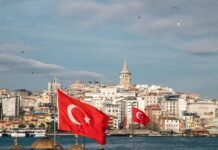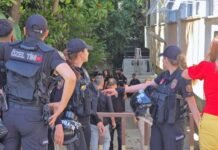A Turkish court on Wednesday blocked access to 340 websites and URLs, including news websites, blogs and social media accounts, at the request of the Security Directorate General, the Mezopotamya news agency (MA) reported.
According to a decision by the Ankara 4th Criminal Court of Peace, the URLs and websites were blocked due to their attempts to legitimize the outlawed Kurdistan Workers’ Party (PKK) and for disseminating terrorist propaganda.
The PKK is listed as a terrorist organization by Turkey and much of the international community.
The blocked addresses include the website of Dutch freelance journalist and author Frederike Geerdink, the pro-Kurdish media group Rudaw, Avesta Publications and the Kurdish Twitter account of MA.
Geerdink said she would take legal action against the decision.
my lawyer in #turkey just let me know that it's a good idea to start a #court case against this decision, so we will. over the years, we've been building up quite a file to take aaaaallll the way to the european court of human rights. but the domestic route is long and slow.
— Frederike Geerdink (@fgeerdink) February 22, 2023
Journalist Fehim Işık, who posted the full list of blocked URLs on Twitter, said despite the bans, people will still find a way to access information.
Artık durum netleşiyor. AKP-MHP seçime gidiyor. İlk iş olarak da sosyal medyada etkin olan hesaplara erişim engeli getirmekle başlamışlar. Ama birileri bu kendini akıllı sananlara söylesin. Dijital dünyayı engellemeye ne onların, ne de onların feriştahlarının gücü yetmez. 1/3 pic.twitter.com/CYrfFEoQcL
— Fehim Işık (@Fehim_Isik) February 22, 2023
Turkish authorities have in the last few years cracked down on websites, social media accounts and posts especially those considered to support “terrorism,” but this has led to accusations that freedom of expression has been curtailed.
Rights groups routinely accuse the Turkish government of trying to keep the press under control by imprisoning journalists, closing down media outlets, overseeing the purchase of media brands by pro-government conglomerates and using regulatory authorities to exert financial pressure, especially after President Recep Tayyip Erdoğan survived a failed coup in July 2016.















